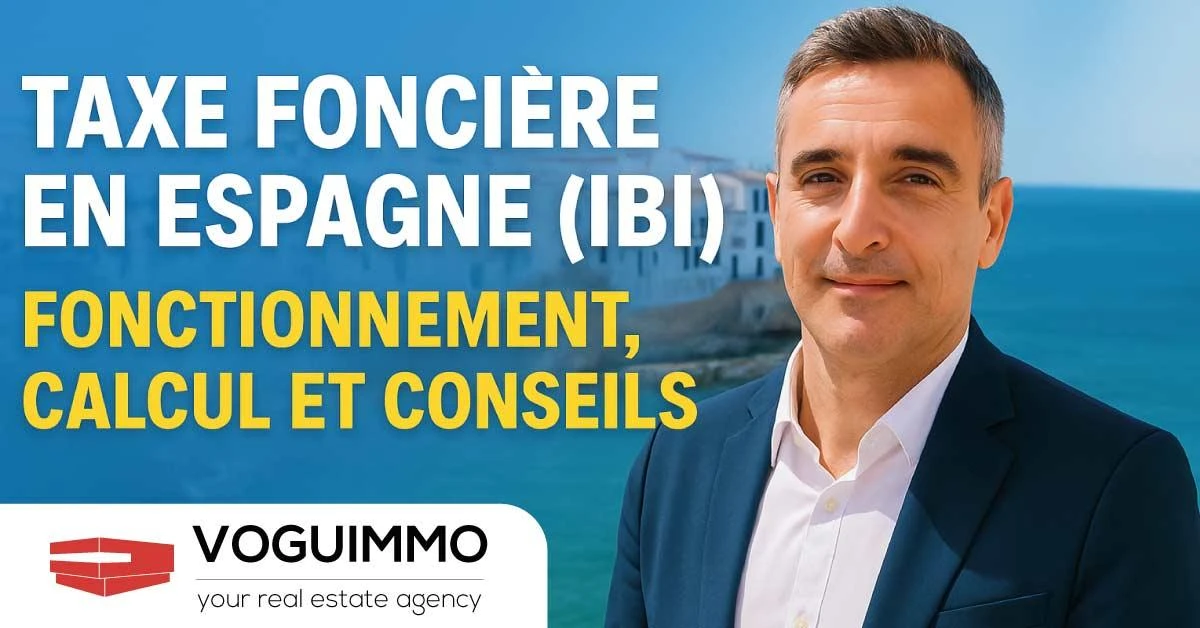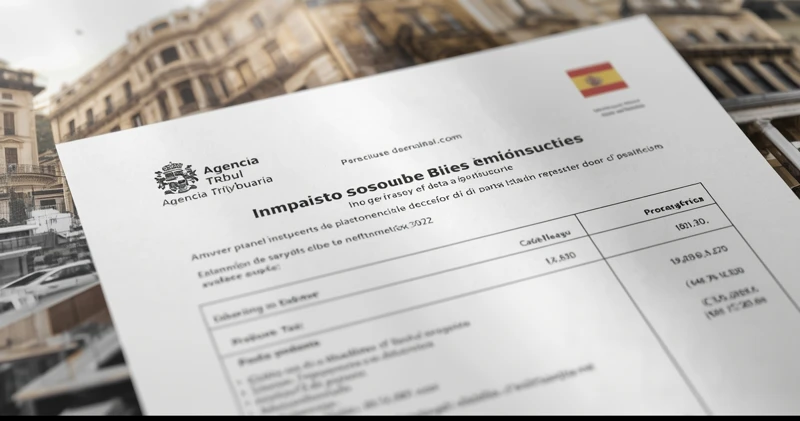Property tax in Spain (IBI): how it works, calculation and advice


Property tax in Spain (IBI): how it works, calculation and advice
Introduction
When you buy a property in Spain, you become liable for a local tax called IBI (Impuesto sobre Bienes Inmuebles). This is the equivalent of French property tax and is levied each year by the local council where the property is located. It is an unavoidable charge for all property owners.
1. What is IBI?
IBI is a municipal tax paid by all owners of property in Spain, whether resident or non-resident. It applies to houses, flats, land and commercial premises. The funds collected are used to finance local public services such as road maintenance, lighting and municipal infrastructure.
2. Who has to pay IBI?
Payment of the IBI is the responsibility of the official owner of the property as recorded in the Spanish land register (Registro de la Propiedad). In the event of a sale, the owner on 1 January of the year is generally the person liable to pay the tax.
3. How is property tax calculated in Spain?
IBI is calculated on the cadastral value (valor catastral) of the property. This value is set by the Spanish land registry and takes into account various criteria:
- The location of the property (town, district, proximity to services).
- The characteristics of the property (surface area, condition, age).
- The use of the property (residential, commercial, bare land).
The rate applied depends on each municipality, but generally varies between 0.4% and 1.3% of the cadastral value.
4. Calculation example
Let's take a flat located in Valencia, with a cadastral value of €120,000 and a municipal rate of 0.9%:
- Taxable base: €120,000
- Rate: 0.9%
- Amount of IBI: €1,080 per year
Each year, the local council sends out a tax notice indicating the amount due and the deadline for payment.
5. When and how is IBI paid?
IBI is paid once a year, at a time that varies from municipality to municipality. Payment can be made:
- By direct debit from a Spanish bank account.
- Directly at the Town Hall counter or via a partner bank.
- Online, via the municipal platform.
It is strongly recommended that you set up a direct debit to avoid oversights and penalties.

6. Differences with property tax in France
Compared with France, Spanish property tax is often lower, but it depends very much on the location of the property. Some large cities such as Madrid or Barcelona apply higher rates than rural areas or small municipalities.
7. Penalties for non-payment
Late or non-payment will result in a surcharge. The local council may apply penalties and, as a last resort, initiate seizure proceedings against the property.
8. Practical advice
To manage IBI properly:
- Ask your lawyer or property manager to check the cadastral value at the time of purchase.
- Include this annual cost in your overall budget.
- Opt for direct debit to avoid any delays.
- Compare the cadastral value with the purchase price: it may be lower, which reduces the tax burden.
Conclusion
Spanish property tax (IBI) is an annual obligation for all property owners. Although the amount is generally reasonable compared with other European countries, it's important to plan ahead and pay it on time. A good understanding of how this works will enable you to manage your property investment in Spain effectively.
Contact VOGUIMMO
📞 WhatsApp:
+33 6 47 20 11 09
📍 Address:
Av. Arquitecto Félix Candela, 30 , 03540 Alicante, Spain📅 Book an Appointment
Book online🕒 Business Hours VOGUIMMO
Monday to Saturday, 9 AM – 7 PM
You might be interested in ...
On the same topic:
FAQ : Tout savoir sur l'IBI et la fiscalité locale espagnole
Oui, de nombreuses mairies offrent des réductions. Les cas les plus courants sont pour les familles nombreuses (familia numerosa) ou, de plus en plus souvent, pour l'installation de panneaux solaires (jusqu'à 50% de réduction pendant plusieurs années selon la commune).
Légalement, c'est le propriétaire qui est redevable devant l'administration. Cependant, la loi espagnole sur les baux urbains (LAU) permet de répercuter ce coût sur le locataire si cela est explicitement indiqué dans le contrat de location.
C'est une confusion fréquente. L'IBI est une taxe locale sur la propriété (équivalent taxe foncière). L'IRNR (Impôt sur le Revenu des Non-Résidents) est un impôt d'État sur le "revenu" (réel si loué, ou fictif si vide). Vous devez payer les deux.
Vous devez impérativement demander au vendeur le dernier reçu de l'IBI (último recibo del IBI) avant de signer. Cela vous permet de vérifier le montant exact et de vous assurer qu'il est à jour de ses paiements.
Pas nécessairement. Il varie si la mairie modifie le taux d'imposition ou si l'État révise la valeur cadastrale. Ces révisions ne sont pas systématiques chaque année, mais suivent des cycles administratifs (ponencia de valores).
Oui, la plupart des mairies proposent un plan de paiement fractionné (par exemple trimestriel). Il faut en faire la demande expresse auprès de l'administration fiscale locale (comme SUMA à Alicante ou l'ORGT à Barcelone).
Oui. Si le garage ou la cave possède sa propre référence cadastrale (indépendante du logement), vous recevrez un avis d'imposition séparé. S'ils sont annexés au logement sur le même acte, leur valeur est incluse dans l'IBI global.
Le non-reçu du courrier ne vous exonère pas du paiement. En Espagne, c'est au contribuable de s'informer. C'est pourquoi la domiciliation bancaire est vitale pour éviter les pénalités pour "oubli".
Si vous louez votre bien et déclarez vos revenus locatifs (en Espagne ou en France), le montant de l'IBI est une charge déductible au prorata de la période louée.
C'est une possibilité récente. La nouvelle loi sur le logement permet aux mairies d'appliquer une sur-taxe (recargo) jusqu'à 150% de l'IBI pour les logements inoccupés de façon permanente sans justification, afin de lutter contre la vacance locative.
Normalement, le notaire informe le Cadastre. Toutefois, il est prudent de se rendre à la mairie ou à l'organisme de gestion fiscale (Diputación) avec votre acte de vente (Copia Simple) pour confirmer le changement et mettre en place le prélèvement.
Oui, mais elles sont limitées : bâtiments de l'État, de l'Église, de la Croix-Rouge, ou certains bâtiments classés au patrimoine historique. Les particuliers sont rarement concernés par une exonération totale.
C'est l'identifiant unique de votre bien (un code alphanumérique de 20 caractères). Il est indispensable pour payer votre IBI, déclarer vos impôts (IRNR) et réaliser toute démarche administrative liée au bien.
Oui, vous pouvez initier une procédure (subsanación de discrepancias) auprès du Cadastre si vous pensez qu'il y a une erreur technique (surface erronée, usage incorrect). C'est une procédure longue qui nécessite souvent l'aide d'un architecte.
Tant que le bien n'est pas livré et inscrit individuellement au Cadastre, c'est généralement le promoteur qui paie l'IBI sur le terrain/l'immeuble en construction. Vous commencerez à payer l'année suivant la livraison de l'appartement.










